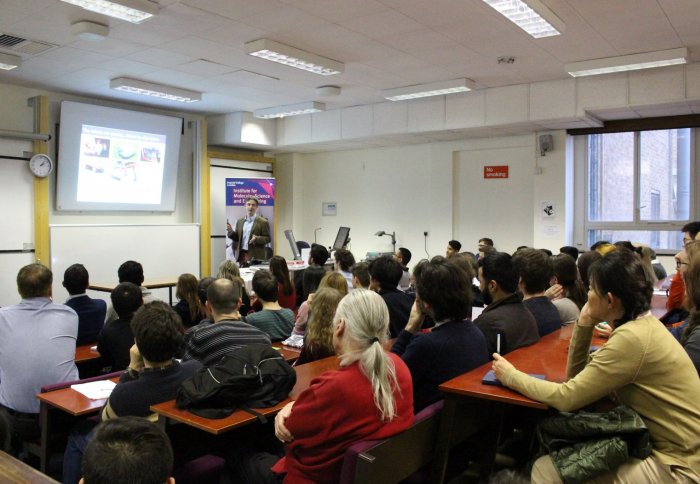Robotic chemistry

Professor Lee Cronin, from the University of Glasgow, recently visited Imperial to present some of his new multidisciplinary 'chemputing' research.
Professor Cronin’s exciting, popular and somewhat controversial talk was the latest in the 2017–18 Highlight Seminar Series from Institute for Molecular Science and Engineering (IMSE). Through this series, the Institute brings eminent speakers to Imperial to discuss cutting-edge work that spans the interface between molecular science and engineering.
Every chemist needs to become an engineer, and every engineer needs to become a chemist.
– Professor Lee Cronin
University of Glasgow Regius Chair of Chemistry
As a pioneer in the so-called chemputing space, Professor Cronin has many ambitious goals. Most formidable, perhaps, is his quest to create artificial life in the laboratory. In this IMSE Highlight Seminar, however, he focused on two different aspects of his work: artificial-intelligence-driven synthesis and the digitisation of chemistry.
Professor Cronin sees the lack of reproducibility in chemical synthesis as one of the major problems in chemistry. Given the modern digital tools available to researchers, however, he believes that this is something that should – and can – change.
3D-printing chemistry
Professor Cronin and his collaborators have thus been working to devise new methods – combining computer programing and 3D printing technologies – to increase the universality of chemical synthesis processes. The value of 3D printing – also known as additive manufacturing – is already widely recognised, especially in the aerospace, medical device and automotive industries. In his work, however, Professor Cronin, is using these modern printing techniques in an innovative, non-standard way to do chemistry.

3D-printing chemical factory. Credit: Lee Cronin and Sergey Zalesskiy
By combining aspects of chemistry and chemical engineering, Professor Cronin’s group have already developed a methodology for autonomous 3D printing of ibuprofen. To do this, they use process-control software to fabricate the reactionware, as well as a computer script that prescribes the chemical processing and synthesis steps.
More recently, in brand-new work published in Science, Professor Cronin and his co-authors have successfully demonstrated their digital chemistry methods for relatively complex chemical synthesis schemes. Looking to the future, this kind of approach could allow specific chemicals to be fabricated, in a simple and cheap manner, by the masses – thus adding a certain level of resilience to the pharmaceutical industry, for example.
Marrying artificial intelligence and chemistry
In the second part of his talk, Professor Cronin spoke about another strand of his research – that of discovery. In particular, Professor Cronin is driven to explore chemical space, in an unbiased way, to find truly novel molecules.

Professor Lee Cronin
For example, he and his team have recently published work in which they used a robot equipped with artificial intelligence (AI) to autonomously create a range of oil-in-water droplets and to evaluate their behaviour with image recognition methods. As the behaviour of the droplets is sensitive to the precise formulation of the oil and water mixtures, the observation of unpredictable, yet desirable properties can lead to the discovery of novel and useful compositions. Furthermore, as the whole system is digitised, it is simple to manufacture the oil-in-water droplets, with exactly the same optimised properties, again and again.
“This work is particularly exciting because it shows we can use machine learning and a novel robotic platform to understand a system in a way that cannot be achieved with conventional laboratory methods”, explained Professor Cronin.
Going forward
Ideally, Professor Cronin would love to create a capable system where he can “let the robot do all the hard work, and leave me with time to think up new ideas”. He is also excited about using AI to help chemists explore new molecules, and sees the Dial-A-Molecule EPSRC Grand Challenge Network at Imperial as a natural place to collaborate. Ultimately, it is his aim to make cheap hardware and software for discovery and synthetic chemistry accessible to everyone.
Upcoming IMSE seminars
IMSE’s Highlight Seminar Series will continue on 22 February 2018 when Professor Jas Pal Badyal FRS (Durham University) will speak on ‘Functional nanocoatings for technological and societal applications’. The full Series is available here.
Article text (excluding photos or graphics) © Imperial College London.
Photos and graphics subject to third party copyright used with permission or © Imperial College London.
Reporter
Dr Shoshana Z Weider
Faculty of Engineering